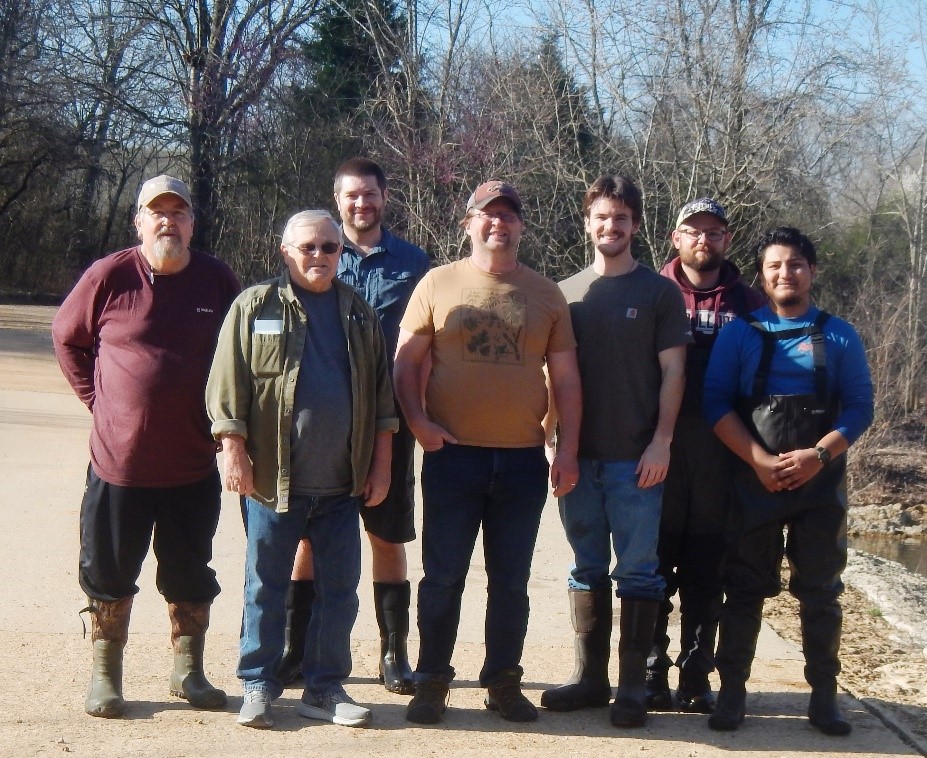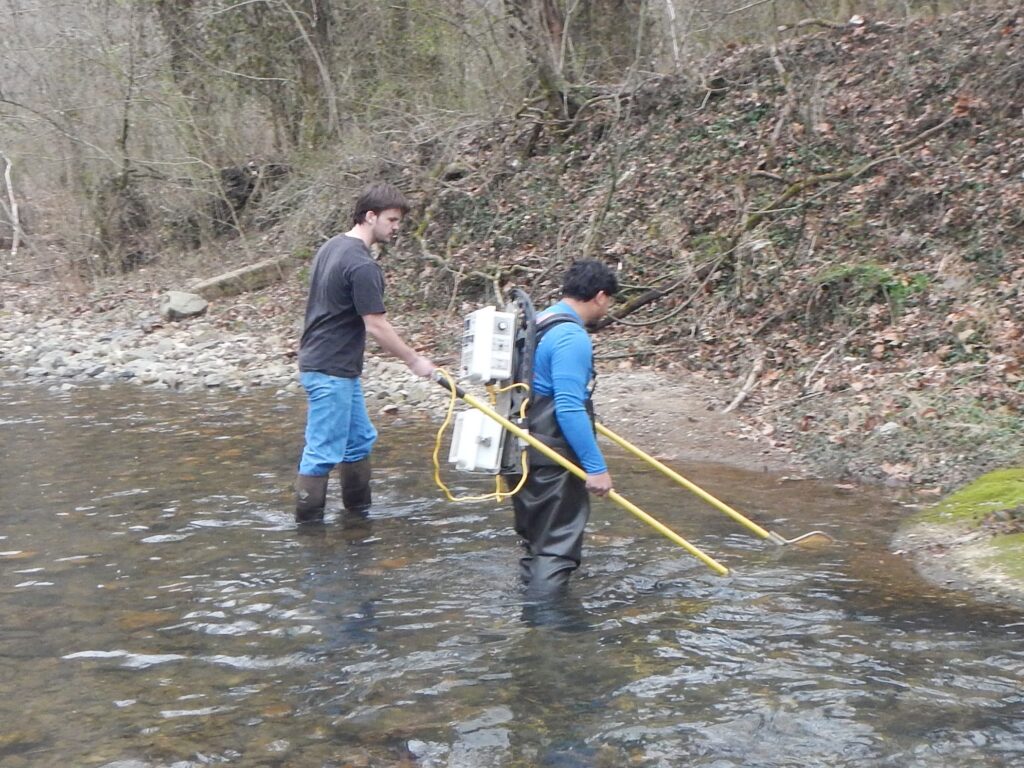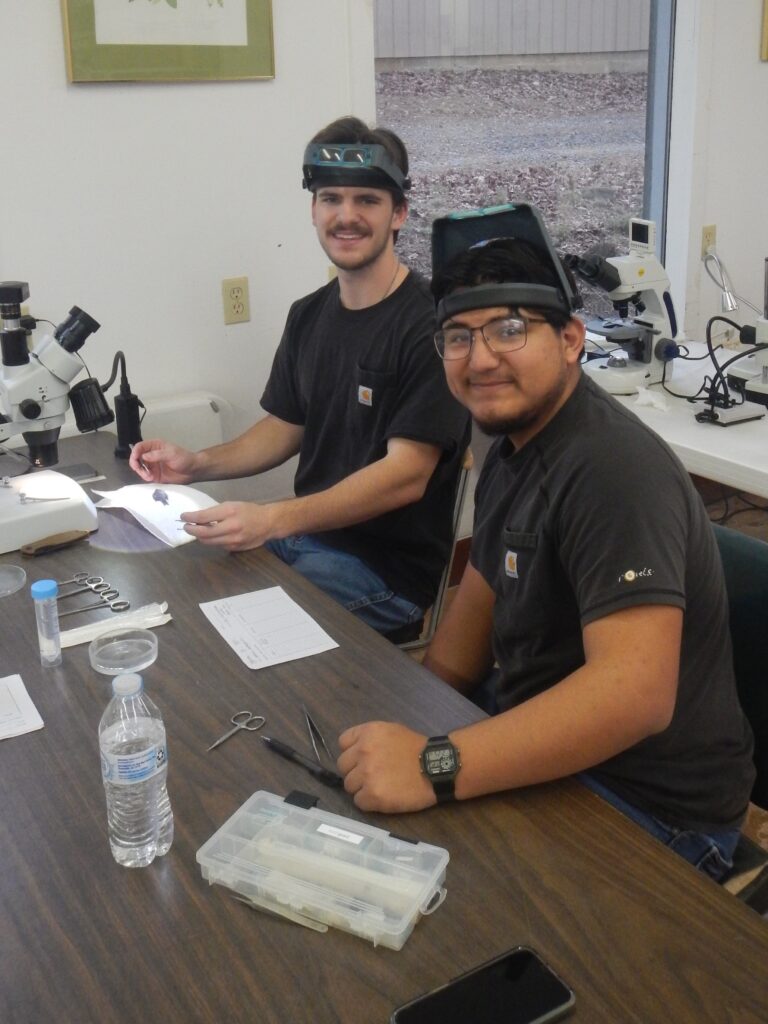Northeast students discover new parasite species

By Lisa Torrez
Staff Writer
The Black River runs through Black Rock, Arkansas with its crystal-clear water which makes it easy to catch fish. This is where Northeast Texas Community College’s own Dr. Chris McAlister, professor of biology, and several of his students spent their spring break studying parasites.
“Dr. Mac,” as he is known by his students on campus, described the experience as “one of the top field trips” of his lifetime.
George Burrows and Michael Rodriguez, two of Dr. Mac’s independent research students, both traveled to the Black River during the short break in March. While the two students have different career tracks, both enjoy studying organisms and spending time outdoors.
Locally, Burrows and Rodriguez have been collecting millipedes and centipedes to study. Soon they will also begin “trapping” gophers to collect and study parasites. When the barn swallows migrate back to the area, they plan to collect fecal samples from those and study the protist parasites that are in the animals’ guts.
Because of the murky waters in the east Texas area, Dr. Mac, Burrows and Rodriguez have been unable to study any fish. Therefore, in general, not a lot of work has been done in Texas on myxozoans, the group of parasites they study.

However, the Black River offered the group an opportunity for clear water fishing where they could more easily collect fish and turtles using the shocker method, a technique in which a machine sends a shockwave and temporarily shocks the organisms, so they rise to the top. Dr. Mac said using the shocker is difficult because it requires crystal clear spring fed water.
During their time there, the students were able to learn from other field experts Dr. Don Cloutman (Kansas), Dr. TJ Fayton (New Hampshire), Eric Leis (Wisconsin), and Logan Robison (Mississippi).
Each morning, the group hit the ground running. They set up the “Mac Lab,” a colleague would go out on the river and fish, bring the fish back and put them in a large vat with a bubbler, so they could study the parasites on the gills of the fish.
As a bonus, they also got to work on turtles. Fayton assisted Burrows and Rodriquez in dissecting and studying the turtles.
“While taking this course I’ve decided that wildlife conservation is the route for me, that is what I want to do,” Rodriguez said. “I love the outdoors. That is mainly the reason why. I’ve loved it so far.”
The most important thing they accomplished on this trip was the opportunity to describe, or discover, 12 to 15 new parasite species.
Dr. Mac has sent leeches from the turtles to the Smithsonian for identification and myxozoans specimens from a top minnow to a molecular biologist for DNA analysis. These myxozoans are usually on the gills, scales or fins of the fish, but they were found in their gut.

Burrows and Rodriguez will soon be graduating. However, Rodriguez plans to take a two-hour independent study course during the upcoming summer. As part of the independent study, Rodriguez and Dr. Mac will travel to Oklahoma to attend the North American Native Fishes Association meeting to work with fish.
Dr. Mac said the good thing about parasitology is there isn’t much competition. The competition is in his lab. While Dr. Mac said there are some parasitologists east of the Mississippi River who could be considered competition, they rarely come west of the Mississippi. The samples they collect on the east side of the Mississippi are not the same as the samples they would collect on the west side.
“We’ve got a great niche. That’s the beautiful thing about working in the area that I’m working in,” Dr. Mac said. “We’re studying parasites, and in some instances, studying them in fish for the very first time, ever since the 1600s, 1700s, and 1800s, before they even had microscopes to even study them.”
This weekend, the group will give individual oral presentations at a meeting in Kingston, OK. Those attending the meeting will be parasitologists including undergraduate and graduate students and professors. Some of the older parasitologists wrote some of the current parasitology textbooks.
Rodriguez and Burrows will get to meet world famous parasitologists who study different areas of parasitology including tapeworms, trematodes, and amoebas, and some medically important ones.
Dr. Mac said his two students will be the only individuals at the conference presenting on myxozoans.
“I’m really looking forward to that because I know that will be the icing on the cake for these two guys in this course,” Dr. Mac said.